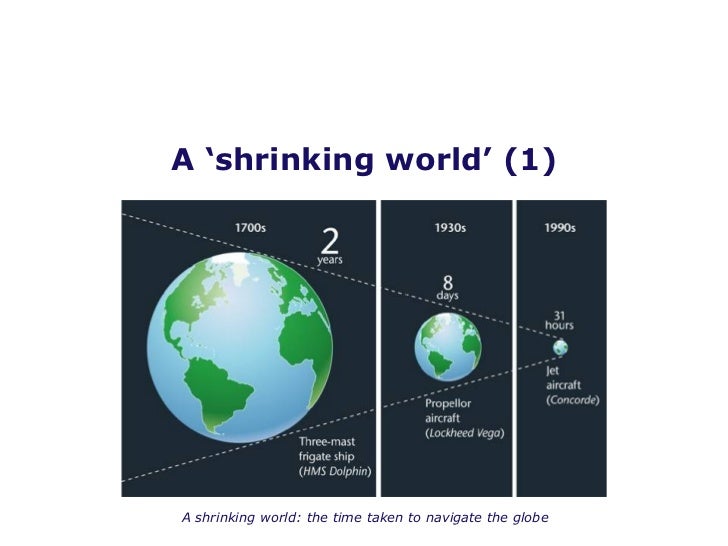A Level Geography - Globalisation Questions
Explain
what is meant by the term 'shrinking world'.
The
term 'shrinking world' describes how the world appears smaller to us because of
globalisation. Globalisation is a process of global integration of economies,
politics, products, ideas and other aspects of culture; it has led to the free
movement of people, companies becoming multinational and an increase in
international trade. Because of the development of technology, we are now able
to communicate and share information in a matter of moments to anywhere in the
world. Many countries can be affected by things that happen in another-for
example the global economy can be affected by a natural disaster.
These
factors create a 'shrinking world', as it is cheaper and more efficient to make
these connections than in the past. The world appears a smaller place because
borders and oceans do not restrict people, information or interactions between
countries on opposite sides of the world.
Assess
the contribution developments in transport, trade, ICT and mobile
communications have made in accelerating globalisation.
Globalisation
is accelerating at a much faster rate today because of the developments in
transport, trade, ICT and mobile communications. It is because of these factors
we are able to create and sustain connections between other countries.
Perhaps
the most important invention which has made globalisation happen so quickly is
the creation of the internet. Initially founded by the US during the Cold War,
ARPANET was designed during the 1960s to send important information.
Connectivity has grown a lot since, and the internet has developed and
blossomed too, allowing us to easily send information and messages in seconds
through social media. This movement of data through cyberspace shows that it is
a contributing factor which is accelerating globalisation. Similar to this, GPS
launched in the 1970s means we can now track deliveries, vehicles and people.
The growth of global production networks can be managed now, many of which
integrate other countries together in order to be successful. GPS has also made
it easy to map and follow routes, as it can pinpoint a person's exact location.
This can be useful in terms of trade, as it means the most efficient routes can
be established. However, it may not be the most useful because it does not
allow for the interaction between two parties-something the internet can do.
On
from this, improvements in trade have quickened the pace of globalisation. The
best example of this is containerisation. This method replaced break bulk
shipping, which took 16 days in loading and unloading. It also meant that large
cargo could be moved faster and in a more cost-effective manner to poorer
locations. Containers that products are placed in are beneficial to the
business too as they are metal, so goods of high prices can be protected with
ease. These containers can be stacked easily, allowing for many to be placed on
one ship; the CSCL Globe cargo ship is the largest in the world and is a prime
example of how efficient trade now is. It is longer than 4 football pitches and
can carry 19,100 containers-each of which can carry a variety of products which
can influence the development and culture of another country. This, of course,
does increase the rate at which globalisation happens as essentials like raw
materials can be transported in days, materials which can help build and
further less developed countries. This means that those countries can then
involve themselves in globalisation and make ties with other countries too.
Advances
in transport has had a knock on effect on how multinational companies have
fared. They have been able to produce and export on a much larger and wider
scale, and, have led to companies moving into countries where it is cheap. This
reduces global unemployment as the companies require unskilled workers in
developing countries, which gives the people more money to spend which
stabilises the economy. This is good as further development of a country means
they will be able to contribute even more to globalisation, accelerating it. If
this happens to all developing countries, then it would happen even faster
which suggests that transport is of great importance because of the impact it
has on these countries.
In
addition to this, innovations like the Trans-Siberian Railway has allowed for
many countries to be connected, so people can move more easily and freely which
has led to a spread of culture across the globe. However, this spread of
culture is not always a good thing as multinational companies can sometimes
take away some of the countries' traditions by imposing a western culture. This
can have catastrophic effects as countries with deep history can often get
lost. Culture attracts tourists and tourists play a large part in driving
economies, without them, a country may find themselves making cuts which may
not be well received by the population.


Comments
Post a Comment